Global Business Environment: Evaluating Globalisation Influences
VerifiedAdded on 2023/06/05
|10
|3170
|249
Report
AI Summary
This report evaluates the influences of globalisation on organisational governance, leadership, structure, culture, and functions, focusing on Sasol Ltd. It applies McKinsey’s 7s Model and Hofstede’s Dimensions of Culture to analyse the impact of globalisation on the company's structure and culture. The report also assesses the influences of ethical and sustainable globalisation on organisational functions such as Human Resources, Finance, Sales and Marketing, and Operations. Different decision-making approaches in a global context, including proactive and reactive strategies, are examined. Furthermore, the report determines various routes to internationalisation and key barriers, providing recommendations on overcoming these barriers and adapting organisational structure and decision-making processes. The analysis highlights the importance of strategic planning, cultural awareness, and ethical considerations in global business operations.
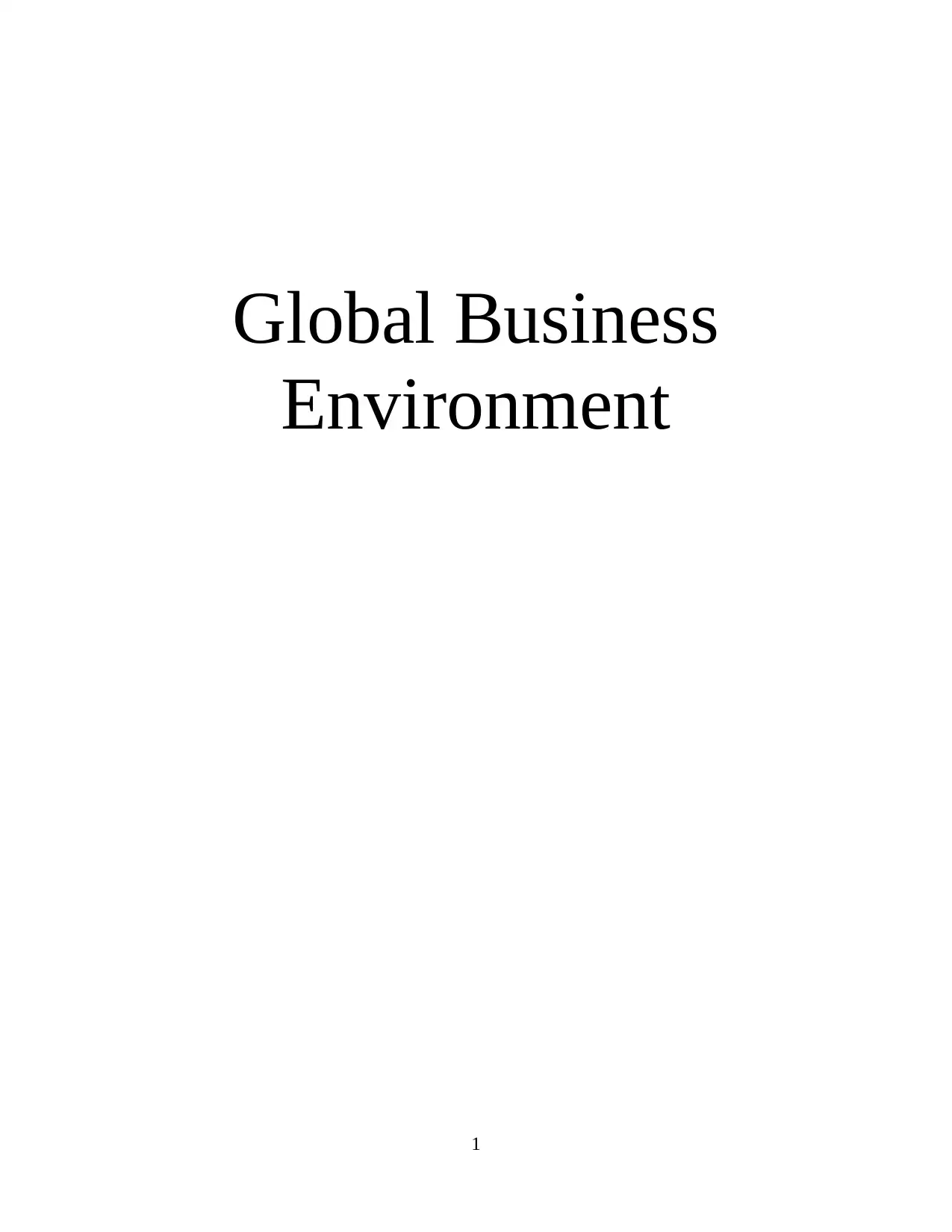
Global Business
Environment
1
Environment
1
Paraphrase This Document
Need a fresh take? Get an instant paraphrase of this document with our AI Paraphraser
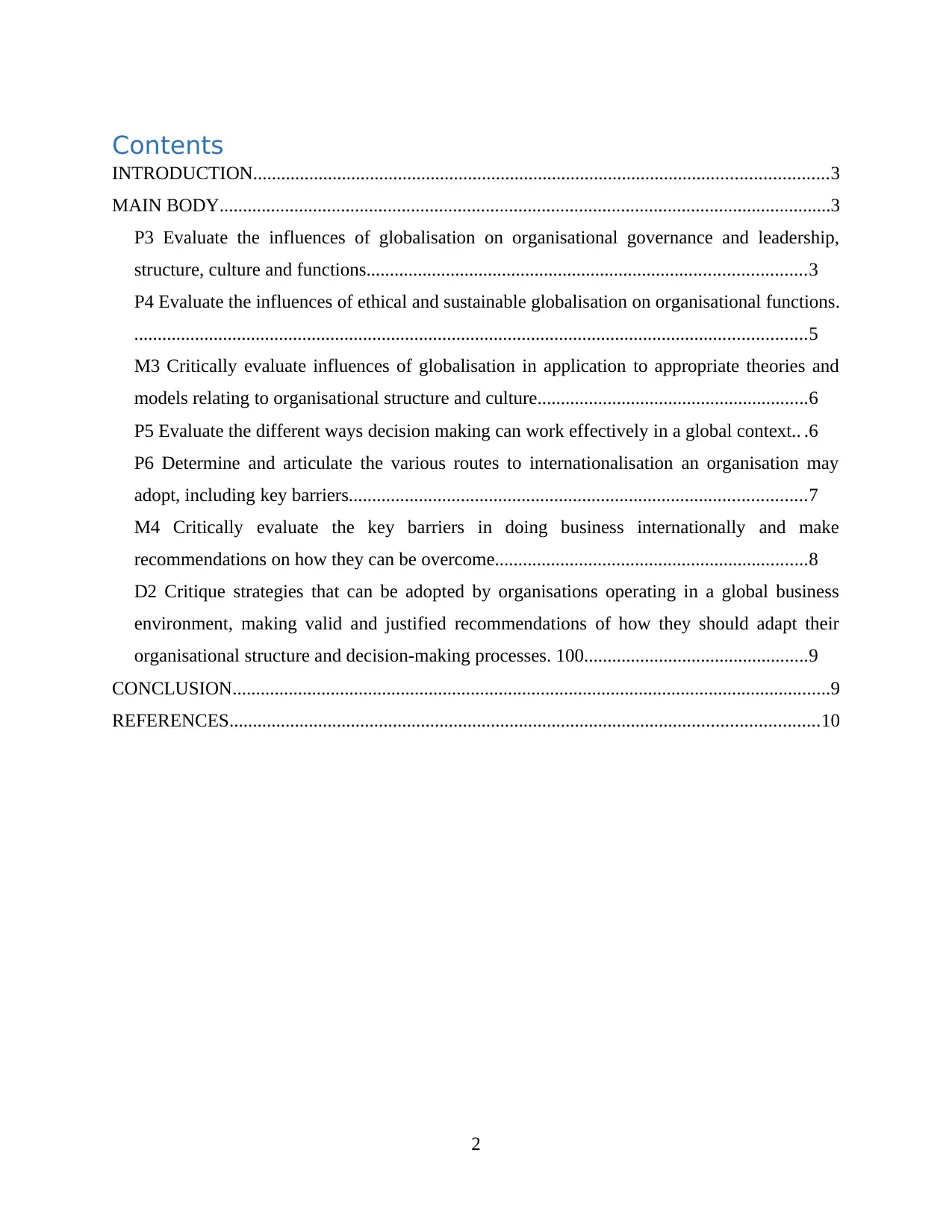
Contents
INTRODUCTION...........................................................................................................................3
MAIN BODY...................................................................................................................................3
P3 Evaluate the influences of globalisation on organisational governance and leadership,
structure, culture and functions..............................................................................................3
P4 Evaluate the influences of ethical and sustainable globalisation on organisational functions.
................................................................................................................................................5
M3 Critically evaluate influences of globalisation in application to appropriate theories and
models relating to organisational structure and culture..........................................................6
P5 Evaluate the different ways decision making can work effectively in a global context.. .6
P6 Determine and articulate the various routes to internationalisation an organisation may
adopt, including key barriers..................................................................................................7
M4 Critically evaluate the key barriers in doing business internationally and make
recommendations on how they can be overcome...................................................................8
D2 Critique strategies that can be adopted by organisations operating in a global business
environment, making valid and justified recommendations of how they should adapt their
organisational structure and decision-making processes. 100................................................9
CONCLUSION................................................................................................................................9
REFERENCES..............................................................................................................................10
2
INTRODUCTION...........................................................................................................................3
MAIN BODY...................................................................................................................................3
P3 Evaluate the influences of globalisation on organisational governance and leadership,
structure, culture and functions..............................................................................................3
P4 Evaluate the influences of ethical and sustainable globalisation on organisational functions.
................................................................................................................................................5
M3 Critically evaluate influences of globalisation in application to appropriate theories and
models relating to organisational structure and culture..........................................................6
P5 Evaluate the different ways decision making can work effectively in a global context.. .6
P6 Determine and articulate the various routes to internationalisation an organisation may
adopt, including key barriers..................................................................................................7
M4 Critically evaluate the key barriers in doing business internationally and make
recommendations on how they can be overcome...................................................................8
D2 Critique strategies that can be adopted by organisations operating in a global business
environment, making valid and justified recommendations of how they should adapt their
organisational structure and decision-making processes. 100................................................9
CONCLUSION................................................................................................................................9
REFERENCES..............................................................................................................................10
2
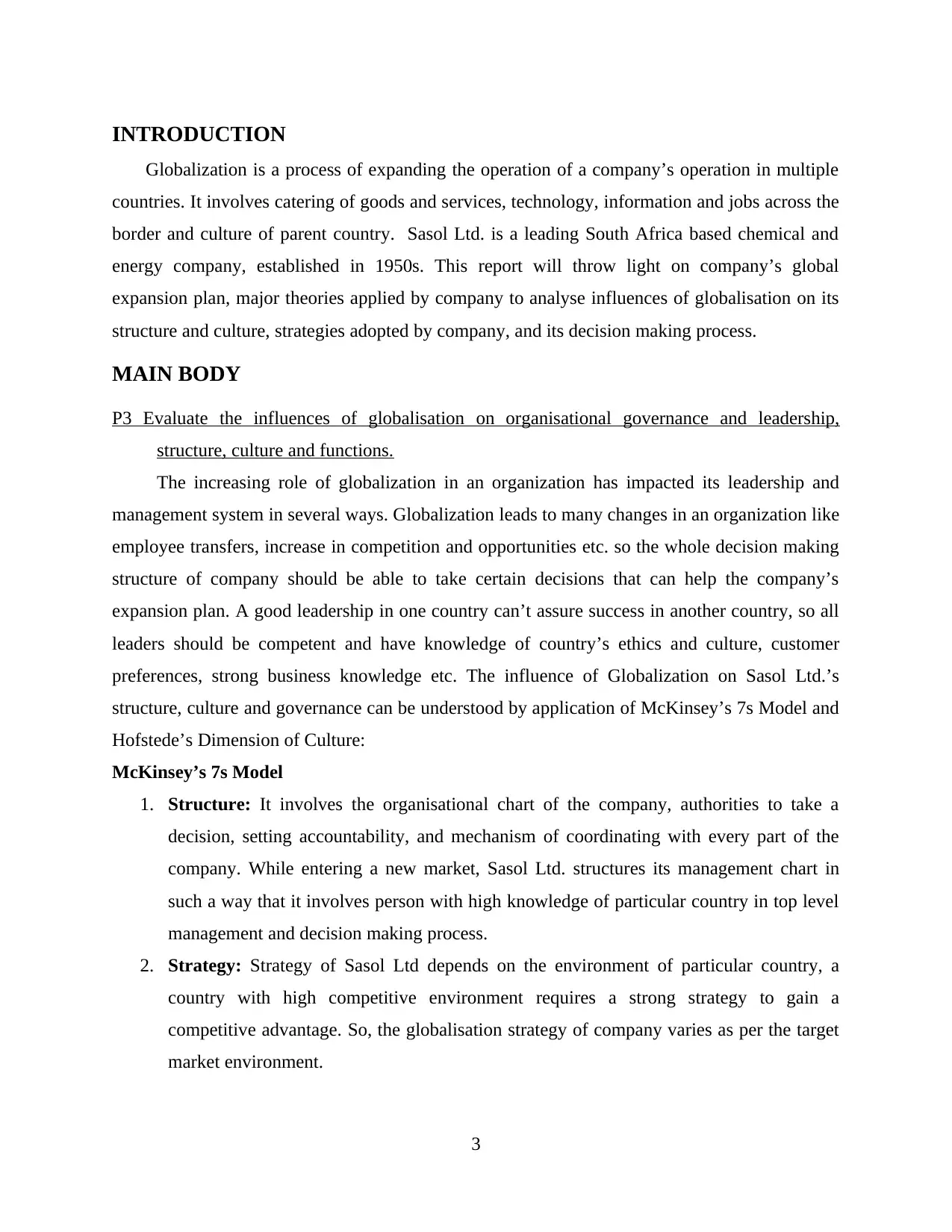
INTRODUCTION
Globalization is a process of expanding the operation of a company’s operation in multiple
countries. It involves catering of goods and services, technology, information and jobs across the
border and culture of parent country. Sasol Ltd. is a leading South Africa based chemical and
energy company, established in 1950s. This report will throw light on company’s global
expansion plan, major theories applied by company to analyse influences of globalisation on its
structure and culture, strategies adopted by company, and its decision making process.
MAIN BODY
P3 Evaluate the influences of globalisation on organisational governance and leadership,
structure, culture and functions.
The increasing role of globalization in an organization has impacted its leadership and
management system in several ways. Globalization leads to many changes in an organization like
employee transfers, increase in competition and opportunities etc. so the whole decision making
structure of company should be able to take certain decisions that can help the company’s
expansion plan. A good leadership in one country can’t assure success in another country, so all
leaders should be competent and have knowledge of country’s ethics and culture, customer
preferences, strong business knowledge etc. The influence of Globalization on Sasol Ltd.’s
structure, culture and governance can be understood by application of McKinsey’s 7s Model and
Hofstede’s Dimension of Culture:
McKinsey’s 7s Model
1. Structure: It involves the organisational chart of the company, authorities to take a
decision, setting accountability, and mechanism of coordinating with every part of the
company. While entering a new market, Sasol Ltd. structures its management chart in
such a way that it involves person with high knowledge of particular country in top level
management and decision making process.
2. Strategy: Strategy of Sasol Ltd depends on the environment of particular country, a
country with high competitive environment requires a strong strategy to gain a
competitive advantage. So, the globalisation strategy of company varies as per the target
market environment.
3
Globalization is a process of expanding the operation of a company’s operation in multiple
countries. It involves catering of goods and services, technology, information and jobs across the
border and culture of parent country. Sasol Ltd. is a leading South Africa based chemical and
energy company, established in 1950s. This report will throw light on company’s global
expansion plan, major theories applied by company to analyse influences of globalisation on its
structure and culture, strategies adopted by company, and its decision making process.
MAIN BODY
P3 Evaluate the influences of globalisation on organisational governance and leadership,
structure, culture and functions.
The increasing role of globalization in an organization has impacted its leadership and
management system in several ways. Globalization leads to many changes in an organization like
employee transfers, increase in competition and opportunities etc. so the whole decision making
structure of company should be able to take certain decisions that can help the company’s
expansion plan. A good leadership in one country can’t assure success in another country, so all
leaders should be competent and have knowledge of country’s ethics and culture, customer
preferences, strong business knowledge etc. The influence of Globalization on Sasol Ltd.’s
structure, culture and governance can be understood by application of McKinsey’s 7s Model and
Hofstede’s Dimension of Culture:
McKinsey’s 7s Model
1. Structure: It involves the organisational chart of the company, authorities to take a
decision, setting accountability, and mechanism of coordinating with every part of the
company. While entering a new market, Sasol Ltd. structures its management chart in
such a way that it involves person with high knowledge of particular country in top level
management and decision making process.
2. Strategy: Strategy of Sasol Ltd depends on the environment of particular country, a
country with high competitive environment requires a strong strategy to gain a
competitive advantage. So, the globalisation strategy of company varies as per the target
market environment.
3
⊘ This is a preview!⊘
Do you want full access?
Subscribe today to unlock all pages.

Trusted by 1+ million students worldwide
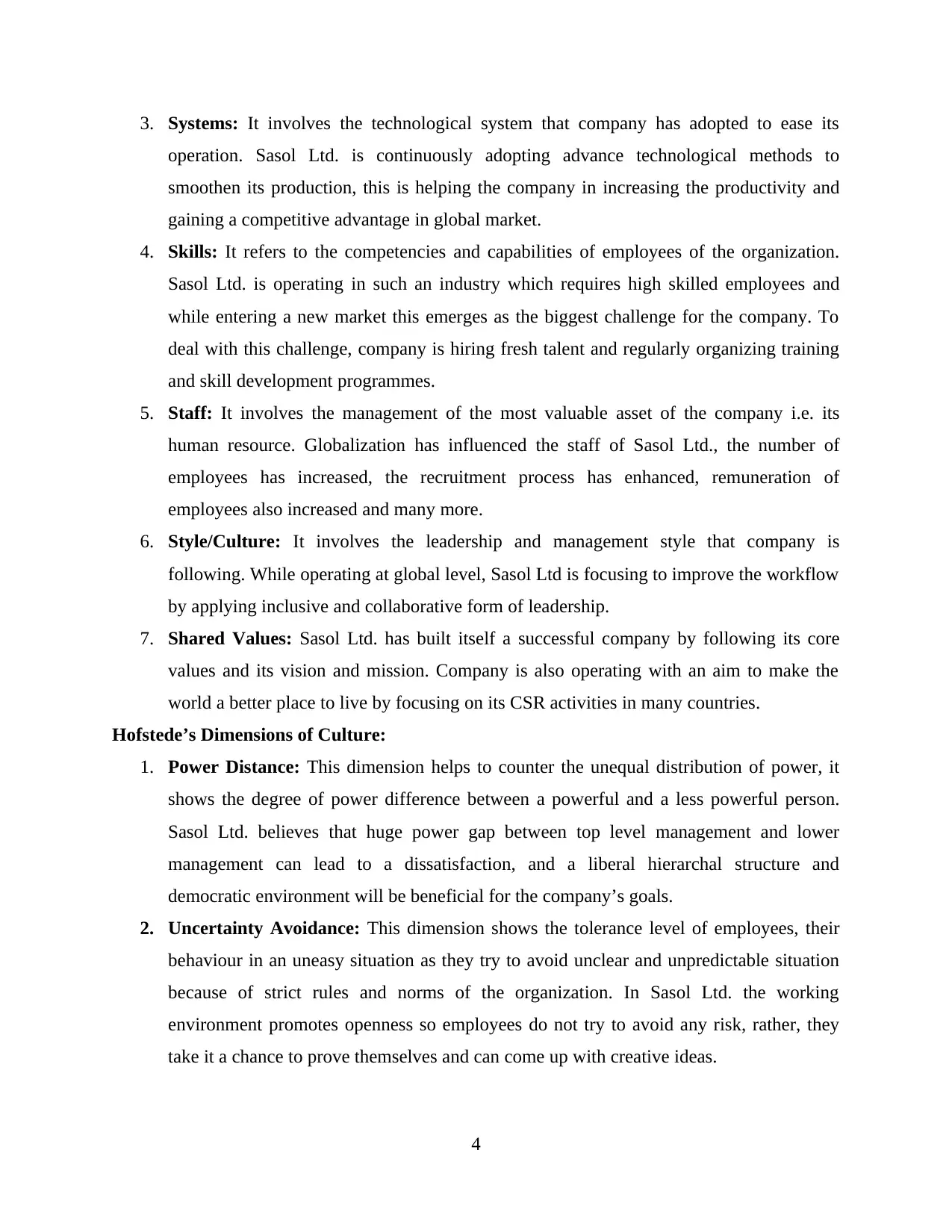
3. Systems: It involves the technological system that company has adopted to ease its
operation. Sasol Ltd. is continuously adopting advance technological methods to
smoothen its production, this is helping the company in increasing the productivity and
gaining a competitive advantage in global market.
4. Skills: It refers to the competencies and capabilities of employees of the organization.
Sasol Ltd. is operating in such an industry which requires high skilled employees and
while entering a new market this emerges as the biggest challenge for the company. To
deal with this challenge, company is hiring fresh talent and regularly organizing training
and skill development programmes.
5. Staff: It involves the management of the most valuable asset of the company i.e. its
human resource. Globalization has influenced the staff of Sasol Ltd., the number of
employees has increased, the recruitment process has enhanced, remuneration of
employees also increased and many more.
6. Style/Culture: It involves the leadership and management style that company is
following. While operating at global level, Sasol Ltd is focusing to improve the workflow
by applying inclusive and collaborative form of leadership.
7. Shared Values: Sasol Ltd. has built itself a successful company by following its core
values and its vision and mission. Company is also operating with an aim to make the
world a better place to live by focusing on its CSR activities in many countries.
Hofstede’s Dimensions of Culture:
1. Power Distance: This dimension helps to counter the unequal distribution of power, it
shows the degree of power difference between a powerful and a less powerful person.
Sasol Ltd. believes that huge power gap between top level management and lower
management can lead to a dissatisfaction, and a liberal hierarchal structure and
democratic environment will be beneficial for the company’s goals.
2. Uncertainty Avoidance: This dimension shows the tolerance level of employees, their
behaviour in an uneasy situation as they try to avoid unclear and unpredictable situation
because of strict rules and norms of the organization. In Sasol Ltd. the working
environment promotes openness so employees do not try to avoid any risk, rather, they
take it a chance to prove themselves and can come up with creative ideas.
4
operation. Sasol Ltd. is continuously adopting advance technological methods to
smoothen its production, this is helping the company in increasing the productivity and
gaining a competitive advantage in global market.
4. Skills: It refers to the competencies and capabilities of employees of the organization.
Sasol Ltd. is operating in such an industry which requires high skilled employees and
while entering a new market this emerges as the biggest challenge for the company. To
deal with this challenge, company is hiring fresh talent and regularly organizing training
and skill development programmes.
5. Staff: It involves the management of the most valuable asset of the company i.e. its
human resource. Globalization has influenced the staff of Sasol Ltd., the number of
employees has increased, the recruitment process has enhanced, remuneration of
employees also increased and many more.
6. Style/Culture: It involves the leadership and management style that company is
following. While operating at global level, Sasol Ltd is focusing to improve the workflow
by applying inclusive and collaborative form of leadership.
7. Shared Values: Sasol Ltd. has built itself a successful company by following its core
values and its vision and mission. Company is also operating with an aim to make the
world a better place to live by focusing on its CSR activities in many countries.
Hofstede’s Dimensions of Culture:
1. Power Distance: This dimension helps to counter the unequal distribution of power, it
shows the degree of power difference between a powerful and a less powerful person.
Sasol Ltd. believes that huge power gap between top level management and lower
management can lead to a dissatisfaction, and a liberal hierarchal structure and
democratic environment will be beneficial for the company’s goals.
2. Uncertainty Avoidance: This dimension shows the tolerance level of employees, their
behaviour in an uneasy situation as they try to avoid unclear and unpredictable situation
because of strict rules and norms of the organization. In Sasol Ltd. the working
environment promotes openness so employees do not try to avoid any risk, rather, they
take it a chance to prove themselves and can come up with creative ideas.
4
Paraphrase This Document
Need a fresh take? Get an instant paraphrase of this document with our AI Paraphraser
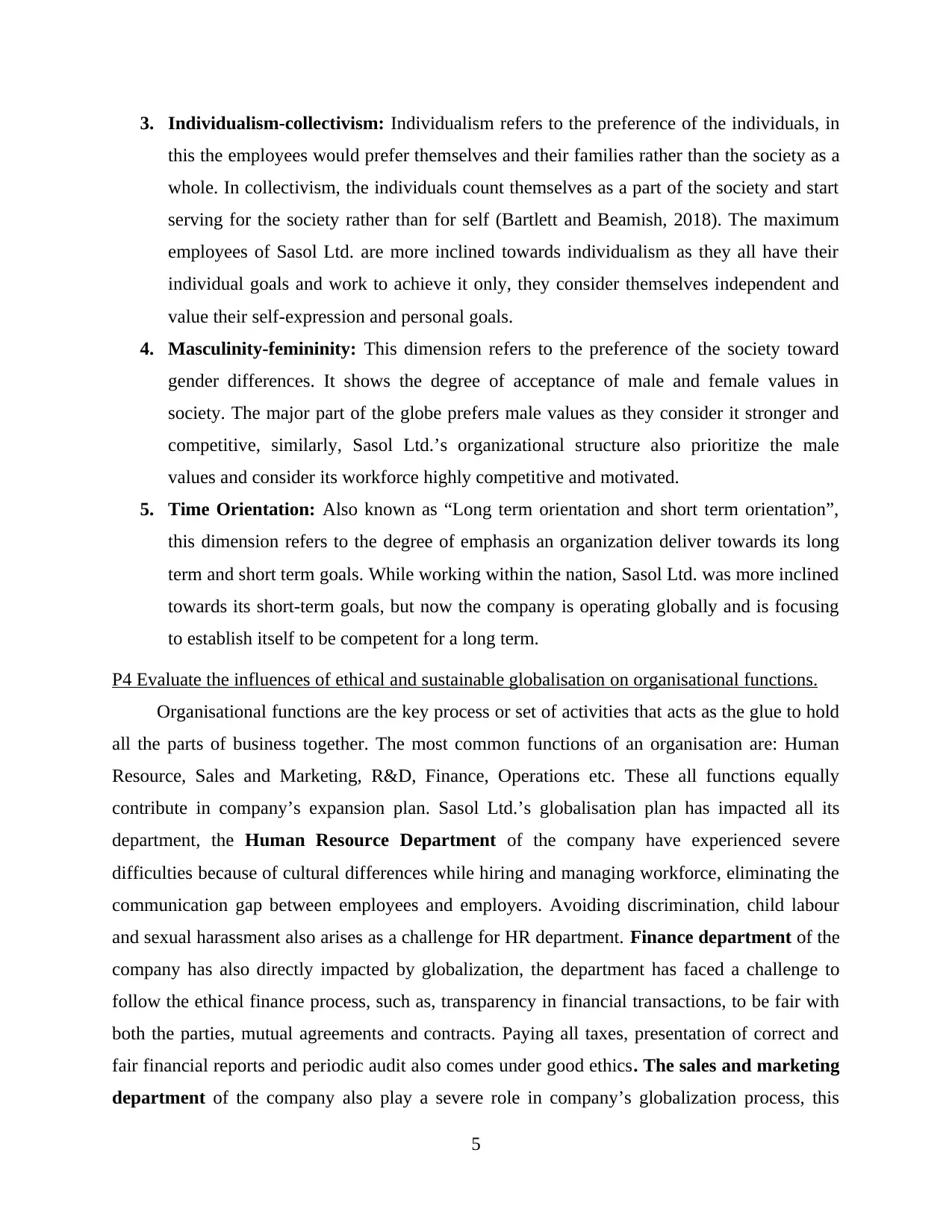
3. Individualism-collectivism: Individualism refers to the preference of the individuals, in
this the employees would prefer themselves and their families rather than the society as a
whole. In collectivism, the individuals count themselves as a part of the society and start
serving for the society rather than for self (Bartlett and Beamish, 2018). The maximum
employees of Sasol Ltd. are more inclined towards individualism as they all have their
individual goals and work to achieve it only, they consider themselves independent and
value their self-expression and personal goals.
4. Masculinity-femininity: This dimension refers to the preference of the society toward
gender differences. It shows the degree of acceptance of male and female values in
society. The major part of the globe prefers male values as they consider it stronger and
competitive, similarly, Sasol Ltd.’s organizational structure also prioritize the male
values and consider its workforce highly competitive and motivated.
5. Time Orientation: Also known as “Long term orientation and short term orientation”,
this dimension refers to the degree of emphasis an organization deliver towards its long
term and short term goals. While working within the nation, Sasol Ltd. was more inclined
towards its short-term goals, but now the company is operating globally and is focusing
to establish itself to be competent for a long term.
P4 Evaluate the influences of ethical and sustainable globalisation on organisational functions.
Organisational functions are the key process or set of activities that acts as the glue to hold
all the parts of business together. The most common functions of an organisation are: Human
Resource, Sales and Marketing, R&D, Finance, Operations etc. These all functions equally
contribute in company’s expansion plan. Sasol Ltd.’s globalisation plan has impacted all its
department, the Human Resource Department of the company have experienced severe
difficulties because of cultural differences while hiring and managing workforce, eliminating the
communication gap between employees and employers. Avoiding discrimination, child labour
and sexual harassment also arises as a challenge for HR department. Finance department of the
company has also directly impacted by globalization, the department has faced a challenge to
follow the ethical finance process, such as, transparency in financial transactions, to be fair with
both the parties, mutual agreements and contracts. Paying all taxes, presentation of correct and
fair financial reports and periodic audit also comes under good ethics. The sales and marketing
department of the company also play a severe role in company’s globalization process, this
5
this the employees would prefer themselves and their families rather than the society as a
whole. In collectivism, the individuals count themselves as a part of the society and start
serving for the society rather than for self (Bartlett and Beamish, 2018). The maximum
employees of Sasol Ltd. are more inclined towards individualism as they all have their
individual goals and work to achieve it only, they consider themselves independent and
value their self-expression and personal goals.
4. Masculinity-femininity: This dimension refers to the preference of the society toward
gender differences. It shows the degree of acceptance of male and female values in
society. The major part of the globe prefers male values as they consider it stronger and
competitive, similarly, Sasol Ltd.’s organizational structure also prioritize the male
values and consider its workforce highly competitive and motivated.
5. Time Orientation: Also known as “Long term orientation and short term orientation”,
this dimension refers to the degree of emphasis an organization deliver towards its long
term and short term goals. While working within the nation, Sasol Ltd. was more inclined
towards its short-term goals, but now the company is operating globally and is focusing
to establish itself to be competent for a long term.
P4 Evaluate the influences of ethical and sustainable globalisation on organisational functions.
Organisational functions are the key process or set of activities that acts as the glue to hold
all the parts of business together. The most common functions of an organisation are: Human
Resource, Sales and Marketing, R&D, Finance, Operations etc. These all functions equally
contribute in company’s expansion plan. Sasol Ltd.’s globalisation plan has impacted all its
department, the Human Resource Department of the company have experienced severe
difficulties because of cultural differences while hiring and managing workforce, eliminating the
communication gap between employees and employers. Avoiding discrimination, child labour
and sexual harassment also arises as a challenge for HR department. Finance department of the
company has also directly impacted by globalization, the department has faced a challenge to
follow the ethical finance process, such as, transparency in financial transactions, to be fair with
both the parties, mutual agreements and contracts. Paying all taxes, presentation of correct and
fair financial reports and periodic audit also comes under good ethics. The sales and marketing
department of the company also play a severe role in company’s globalization process, this
5
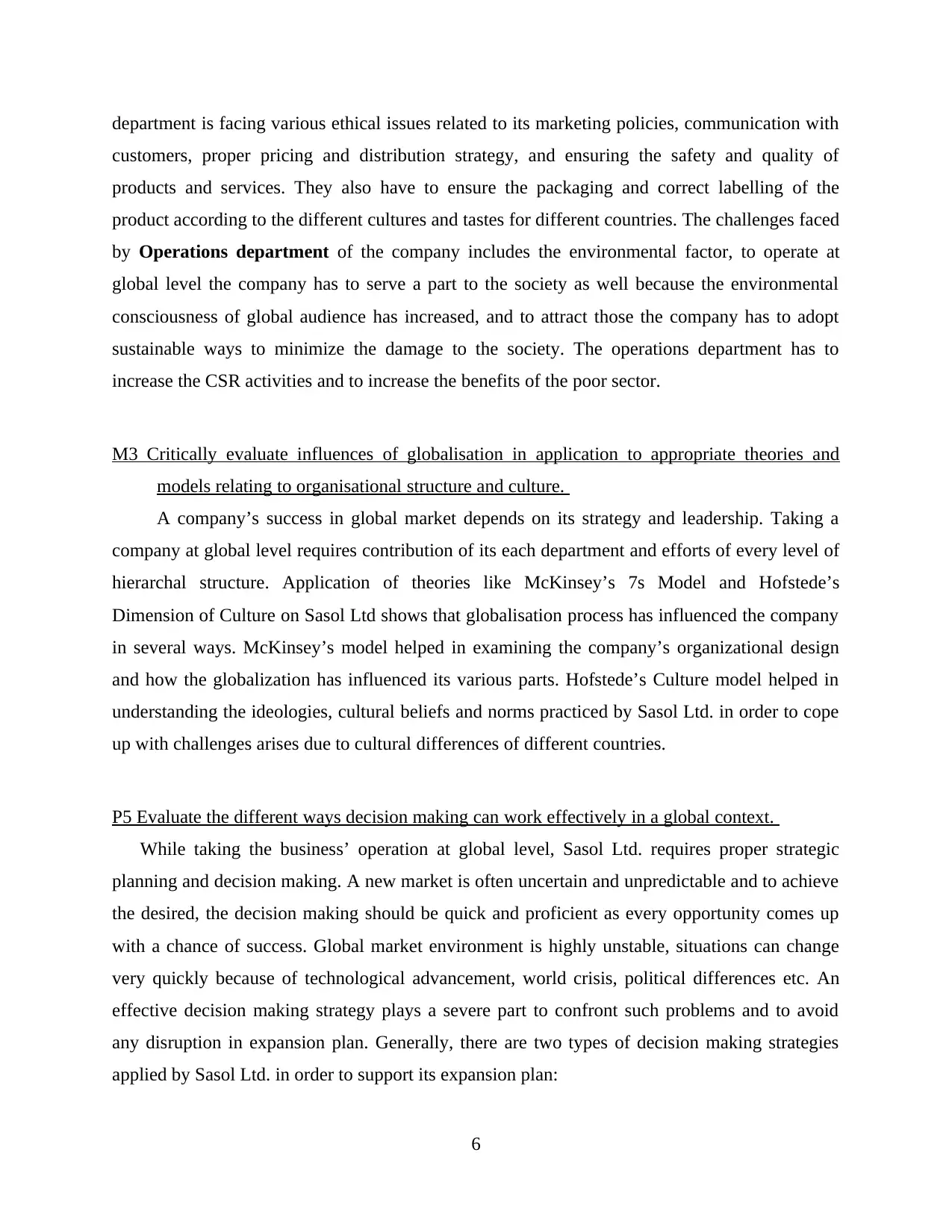
department is facing various ethical issues related to its marketing policies, communication with
customers, proper pricing and distribution strategy, and ensuring the safety and quality of
products and services. They also have to ensure the packaging and correct labelling of the
product according to the different cultures and tastes for different countries. The challenges faced
by Operations department of the company includes the environmental factor, to operate at
global level the company has to serve a part to the society as well because the environmental
consciousness of global audience has increased, and to attract those the company has to adopt
sustainable ways to minimize the damage to the society. The operations department has to
increase the CSR activities and to increase the benefits of the poor sector.
M3 Critically evaluate influences of globalisation in application to appropriate theories and
models relating to organisational structure and culture.
A company’s success in global market depends on its strategy and leadership. Taking a
company at global level requires contribution of its each department and efforts of every level of
hierarchal structure. Application of theories like McKinsey’s 7s Model and Hofstede’s
Dimension of Culture on Sasol Ltd shows that globalisation process has influenced the company
in several ways. McKinsey’s model helped in examining the company’s organizational design
and how the globalization has influenced its various parts. Hofstede’s Culture model helped in
understanding the ideologies, cultural beliefs and norms practiced by Sasol Ltd. in order to cope
up with challenges arises due to cultural differences of different countries.
P5 Evaluate the different ways decision making can work effectively in a global context.
While taking the business’ operation at global level, Sasol Ltd. requires proper strategic
planning and decision making. A new market is often uncertain and unpredictable and to achieve
the desired, the decision making should be quick and proficient as every opportunity comes up
with a chance of success. Global market environment is highly unstable, situations can change
very quickly because of technological advancement, world crisis, political differences etc. An
effective decision making strategy plays a severe part to confront such problems and to avoid
any disruption in expansion plan. Generally, there are two types of decision making strategies
applied by Sasol Ltd. in order to support its expansion plan:
6
customers, proper pricing and distribution strategy, and ensuring the safety and quality of
products and services. They also have to ensure the packaging and correct labelling of the
product according to the different cultures and tastes for different countries. The challenges faced
by Operations department of the company includes the environmental factor, to operate at
global level the company has to serve a part to the society as well because the environmental
consciousness of global audience has increased, and to attract those the company has to adopt
sustainable ways to minimize the damage to the society. The operations department has to
increase the CSR activities and to increase the benefits of the poor sector.
M3 Critically evaluate influences of globalisation in application to appropriate theories and
models relating to organisational structure and culture.
A company’s success in global market depends on its strategy and leadership. Taking a
company at global level requires contribution of its each department and efforts of every level of
hierarchal structure. Application of theories like McKinsey’s 7s Model and Hofstede’s
Dimension of Culture on Sasol Ltd shows that globalisation process has influenced the company
in several ways. McKinsey’s model helped in examining the company’s organizational design
and how the globalization has influenced its various parts. Hofstede’s Culture model helped in
understanding the ideologies, cultural beliefs and norms practiced by Sasol Ltd. in order to cope
up with challenges arises due to cultural differences of different countries.
P5 Evaluate the different ways decision making can work effectively in a global context.
While taking the business’ operation at global level, Sasol Ltd. requires proper strategic
planning and decision making. A new market is often uncertain and unpredictable and to achieve
the desired, the decision making should be quick and proficient as every opportunity comes up
with a chance of success. Global market environment is highly unstable, situations can change
very quickly because of technological advancement, world crisis, political differences etc. An
effective decision making strategy plays a severe part to confront such problems and to avoid
any disruption in expansion plan. Generally, there are two types of decision making strategies
applied by Sasol Ltd. in order to support its expansion plan:
6
⊘ This is a preview!⊘
Do you want full access?
Subscribe today to unlock all pages.

Trusted by 1+ million students worldwide
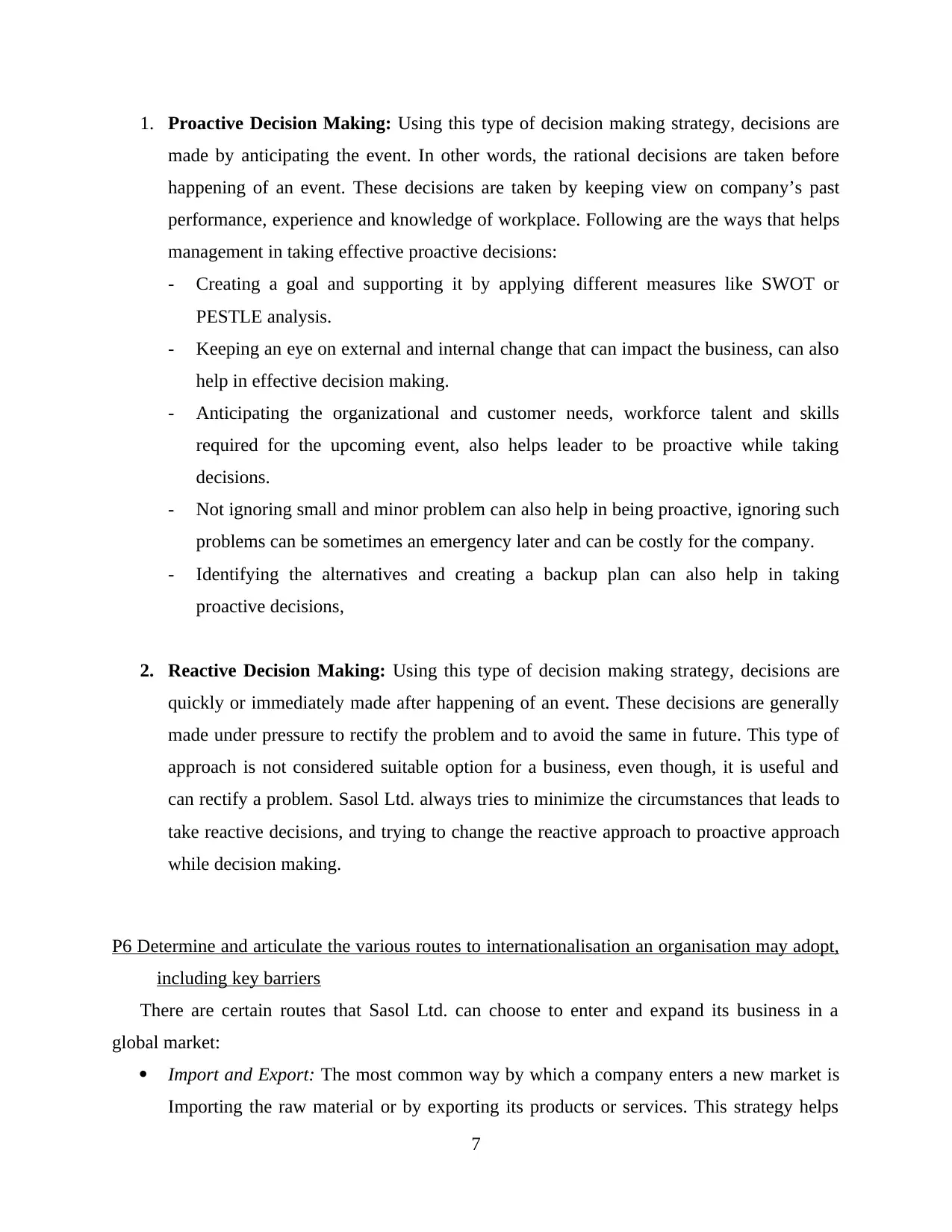
1. Proactive Decision Making: Using this type of decision making strategy, decisions are
made by anticipating the event. In other words, the rational decisions are taken before
happening of an event. These decisions are taken by keeping view on company’s past
performance, experience and knowledge of workplace. Following are the ways that helps
management in taking effective proactive decisions:
- Creating a goal and supporting it by applying different measures like SWOT or
PESTLE analysis.
- Keeping an eye on external and internal change that can impact the business, can also
help in effective decision making.
- Anticipating the organizational and customer needs, workforce talent and skills
required for the upcoming event, also helps leader to be proactive while taking
decisions.
- Not ignoring small and minor problem can also help in being proactive, ignoring such
problems can be sometimes an emergency later and can be costly for the company.
- Identifying the alternatives and creating a backup plan can also help in taking
proactive decisions,
2. Reactive Decision Making: Using this type of decision making strategy, decisions are
quickly or immediately made after happening of an event. These decisions are generally
made under pressure to rectify the problem and to avoid the same in future. This type of
approach is not considered suitable option for a business, even though, it is useful and
can rectify a problem. Sasol Ltd. always tries to minimize the circumstances that leads to
take reactive decisions, and trying to change the reactive approach to proactive approach
while decision making.
P6 Determine and articulate the various routes to internationalisation an organisation may adopt,
including key barriers
There are certain routes that Sasol Ltd. can choose to enter and expand its business in a
global market:
Import and Export: The most common way by which a company enters a new market is
Importing the raw material or by exporting its products or services. This strategy helps
7
made by anticipating the event. In other words, the rational decisions are taken before
happening of an event. These decisions are taken by keeping view on company’s past
performance, experience and knowledge of workplace. Following are the ways that helps
management in taking effective proactive decisions:
- Creating a goal and supporting it by applying different measures like SWOT or
PESTLE analysis.
- Keeping an eye on external and internal change that can impact the business, can also
help in effective decision making.
- Anticipating the organizational and customer needs, workforce talent and skills
required for the upcoming event, also helps leader to be proactive while taking
decisions.
- Not ignoring small and minor problem can also help in being proactive, ignoring such
problems can be sometimes an emergency later and can be costly for the company.
- Identifying the alternatives and creating a backup plan can also help in taking
proactive decisions,
2. Reactive Decision Making: Using this type of decision making strategy, decisions are
quickly or immediately made after happening of an event. These decisions are generally
made under pressure to rectify the problem and to avoid the same in future. This type of
approach is not considered suitable option for a business, even though, it is useful and
can rectify a problem. Sasol Ltd. always tries to minimize the circumstances that leads to
take reactive decisions, and trying to change the reactive approach to proactive approach
while decision making.
P6 Determine and articulate the various routes to internationalisation an organisation may adopt,
including key barriers
There are certain routes that Sasol Ltd. can choose to enter and expand its business in a
global market:
Import and Export: The most common way by which a company enters a new market is
Importing the raw material or by exporting its products or services. This strategy helps
7
Paraphrase This Document
Need a fresh take? Get an instant paraphrase of this document with our AI Paraphraser
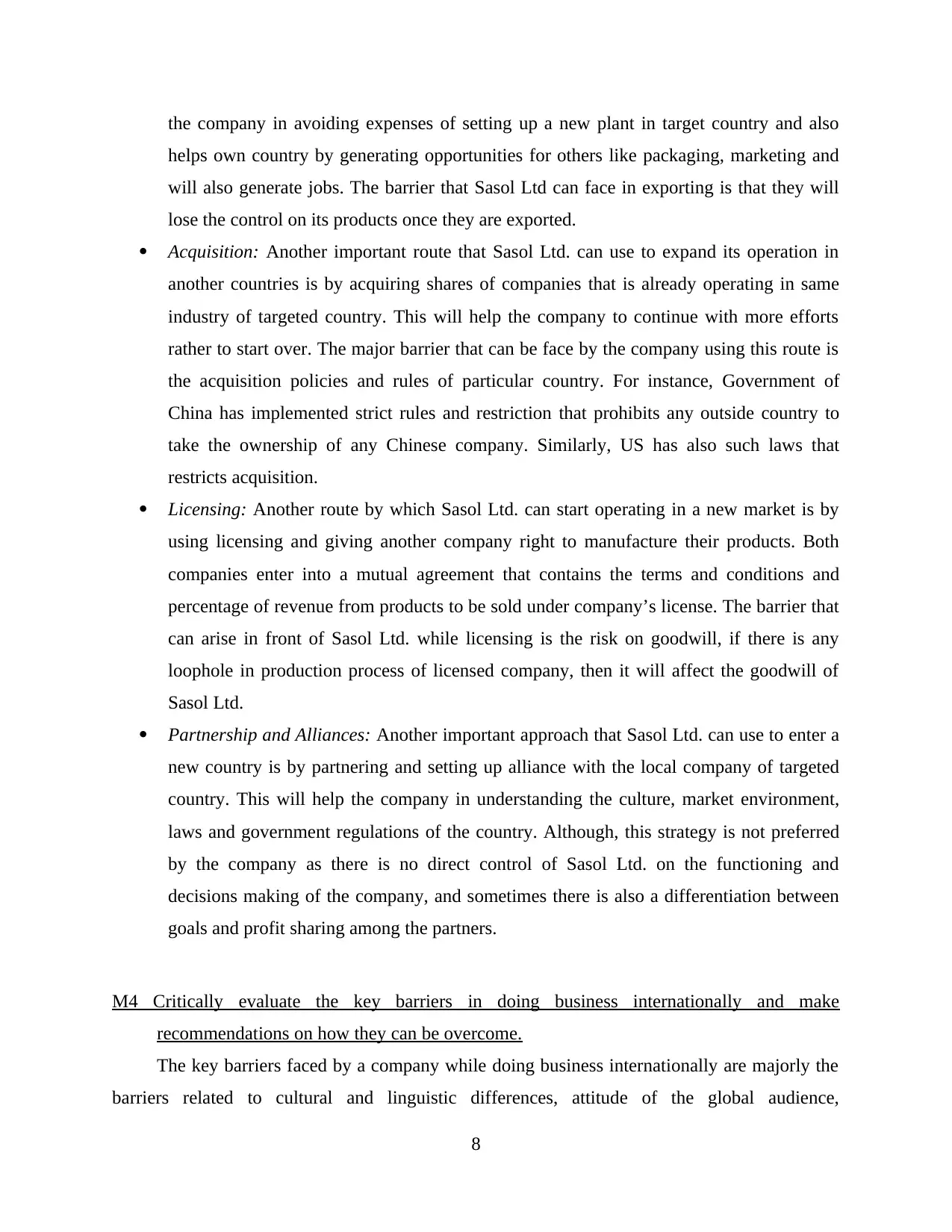
the company in avoiding expenses of setting up a new plant in target country and also
helps own country by generating opportunities for others like packaging, marketing and
will also generate jobs. The barrier that Sasol Ltd can face in exporting is that they will
lose the control on its products once they are exported.
Acquisition: Another important route that Sasol Ltd. can use to expand its operation in
another countries is by acquiring shares of companies that is already operating in same
industry of targeted country. This will help the company to continue with more efforts
rather to start over. The major barrier that can be face by the company using this route is
the acquisition policies and rules of particular country. For instance, Government of
China has implemented strict rules and restriction that prohibits any outside country to
take the ownership of any Chinese company. Similarly, US has also such laws that
restricts acquisition.
Licensing: Another route by which Sasol Ltd. can start operating in a new market is by
using licensing and giving another company right to manufacture their products. Both
companies enter into a mutual agreement that contains the terms and conditions and
percentage of revenue from products to be sold under company’s license. The barrier that
can arise in front of Sasol Ltd. while licensing is the risk on goodwill, if there is any
loophole in production process of licensed company, then it will affect the goodwill of
Sasol Ltd.
Partnership and Alliances: Another important approach that Sasol Ltd. can use to enter a
new country is by partnering and setting up alliance with the local company of targeted
country. This will help the company in understanding the culture, market environment,
laws and government regulations of the country. Although, this strategy is not preferred
by the company as there is no direct control of Sasol Ltd. on the functioning and
decisions making of the company, and sometimes there is also a differentiation between
goals and profit sharing among the partners.
M4 Critically evaluate the key barriers in doing business internationally and make
recommendations on how they can be overcome.
The key barriers faced by a company while doing business internationally are majorly the
barriers related to cultural and linguistic differences, attitude of the global audience,
8
helps own country by generating opportunities for others like packaging, marketing and
will also generate jobs. The barrier that Sasol Ltd can face in exporting is that they will
lose the control on its products once they are exported.
Acquisition: Another important route that Sasol Ltd. can use to expand its operation in
another countries is by acquiring shares of companies that is already operating in same
industry of targeted country. This will help the company to continue with more efforts
rather to start over. The major barrier that can be face by the company using this route is
the acquisition policies and rules of particular country. For instance, Government of
China has implemented strict rules and restriction that prohibits any outside country to
take the ownership of any Chinese company. Similarly, US has also such laws that
restricts acquisition.
Licensing: Another route by which Sasol Ltd. can start operating in a new market is by
using licensing and giving another company right to manufacture their products. Both
companies enter into a mutual agreement that contains the terms and conditions and
percentage of revenue from products to be sold under company’s license. The barrier that
can arise in front of Sasol Ltd. while licensing is the risk on goodwill, if there is any
loophole in production process of licensed company, then it will affect the goodwill of
Sasol Ltd.
Partnership and Alliances: Another important approach that Sasol Ltd. can use to enter a
new country is by partnering and setting up alliance with the local company of targeted
country. This will help the company in understanding the culture, market environment,
laws and government regulations of the country. Although, this strategy is not preferred
by the company as there is no direct control of Sasol Ltd. on the functioning and
decisions making of the company, and sometimes there is also a differentiation between
goals and profit sharing among the partners.
M4 Critically evaluate the key barriers in doing business internationally and make
recommendations on how they can be overcome.
The key barriers faced by a company while doing business internationally are majorly the
barriers related to cultural and linguistic differences, attitude of the global audience,
8
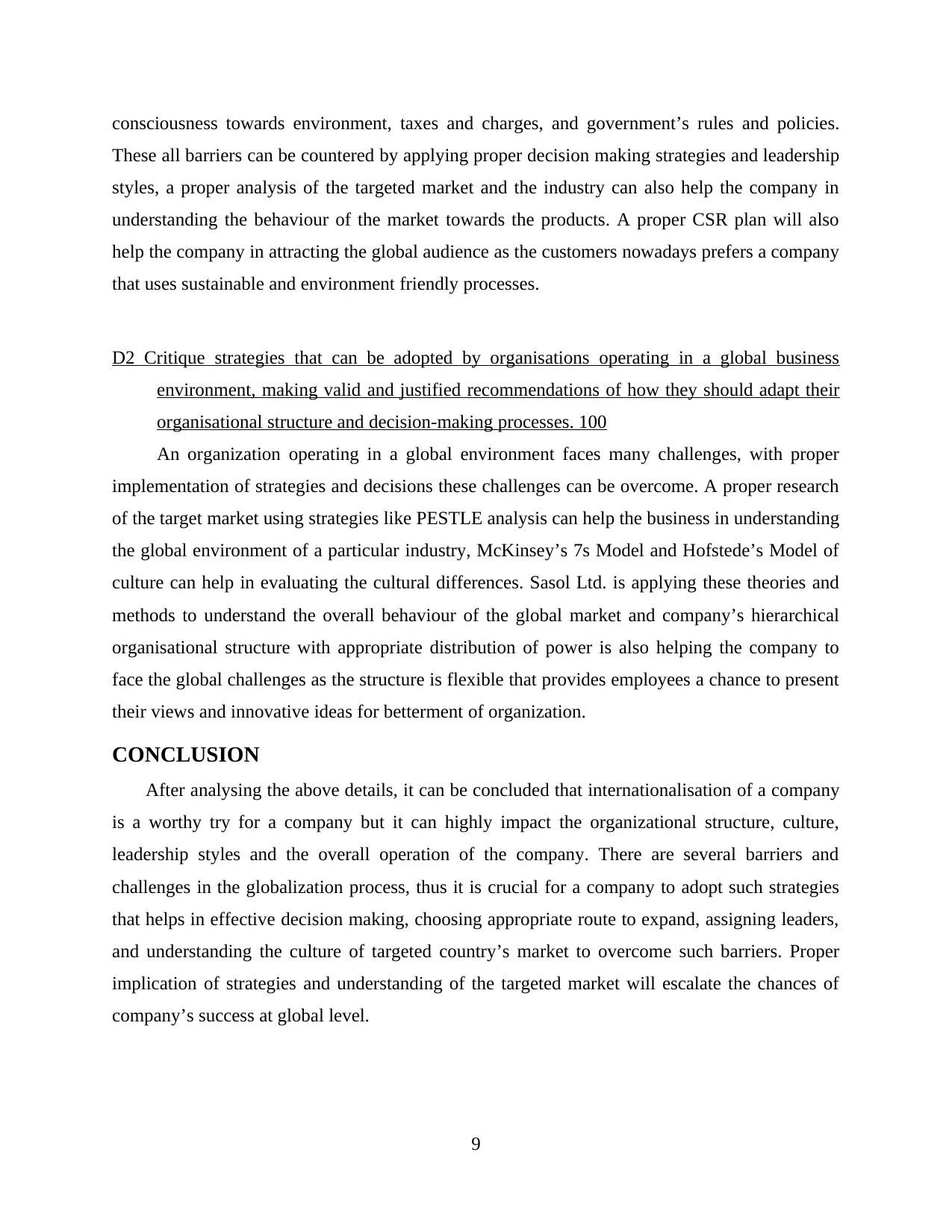
consciousness towards environment, taxes and charges, and government’s rules and policies.
These all barriers can be countered by applying proper decision making strategies and leadership
styles, a proper analysis of the targeted market and the industry can also help the company in
understanding the behaviour of the market towards the products. A proper CSR plan will also
help the company in attracting the global audience as the customers nowadays prefers a company
that uses sustainable and environment friendly processes.
D2 Critique strategies that can be adopted by organisations operating in a global business
environment, making valid and justified recommendations of how they should adapt their
organisational structure and decision-making processes. 100
An organization operating in a global environment faces many challenges, with proper
implementation of strategies and decisions these challenges can be overcome. A proper research
of the target market using strategies like PESTLE analysis can help the business in understanding
the global environment of a particular industry, McKinsey’s 7s Model and Hofstede’s Model of
culture can help in evaluating the cultural differences. Sasol Ltd. is applying these theories and
methods to understand the overall behaviour of the global market and company’s hierarchical
organisational structure with appropriate distribution of power is also helping the company to
face the global challenges as the structure is flexible that provides employees a chance to present
their views and innovative ideas for betterment of organization.
CONCLUSION
After analysing the above details, it can be concluded that internationalisation of a company
is a worthy try for a company but it can highly impact the organizational structure, culture,
leadership styles and the overall operation of the company. There are several barriers and
challenges in the globalization process, thus it is crucial for a company to adopt such strategies
that helps in effective decision making, choosing appropriate route to expand, assigning leaders,
and understanding the culture of targeted country’s market to overcome such barriers. Proper
implication of strategies and understanding of the targeted market will escalate the chances of
company’s success at global level.
9
These all barriers can be countered by applying proper decision making strategies and leadership
styles, a proper analysis of the targeted market and the industry can also help the company in
understanding the behaviour of the market towards the products. A proper CSR plan will also
help the company in attracting the global audience as the customers nowadays prefers a company
that uses sustainable and environment friendly processes.
D2 Critique strategies that can be adopted by organisations operating in a global business
environment, making valid and justified recommendations of how they should adapt their
organisational structure and decision-making processes. 100
An organization operating in a global environment faces many challenges, with proper
implementation of strategies and decisions these challenges can be overcome. A proper research
of the target market using strategies like PESTLE analysis can help the business in understanding
the global environment of a particular industry, McKinsey’s 7s Model and Hofstede’s Model of
culture can help in evaluating the cultural differences. Sasol Ltd. is applying these theories and
methods to understand the overall behaviour of the global market and company’s hierarchical
organisational structure with appropriate distribution of power is also helping the company to
face the global challenges as the structure is flexible that provides employees a chance to present
their views and innovative ideas for betterment of organization.
CONCLUSION
After analysing the above details, it can be concluded that internationalisation of a company
is a worthy try for a company but it can highly impact the organizational structure, culture,
leadership styles and the overall operation of the company. There are several barriers and
challenges in the globalization process, thus it is crucial for a company to adopt such strategies
that helps in effective decision making, choosing appropriate route to expand, assigning leaders,
and understanding the culture of targeted country’s market to overcome such barriers. Proper
implication of strategies and understanding of the targeted market will escalate the chances of
company’s success at global level.
9
⊘ This is a preview!⊘
Do you want full access?
Subscribe today to unlock all pages.

Trusted by 1+ million students worldwide
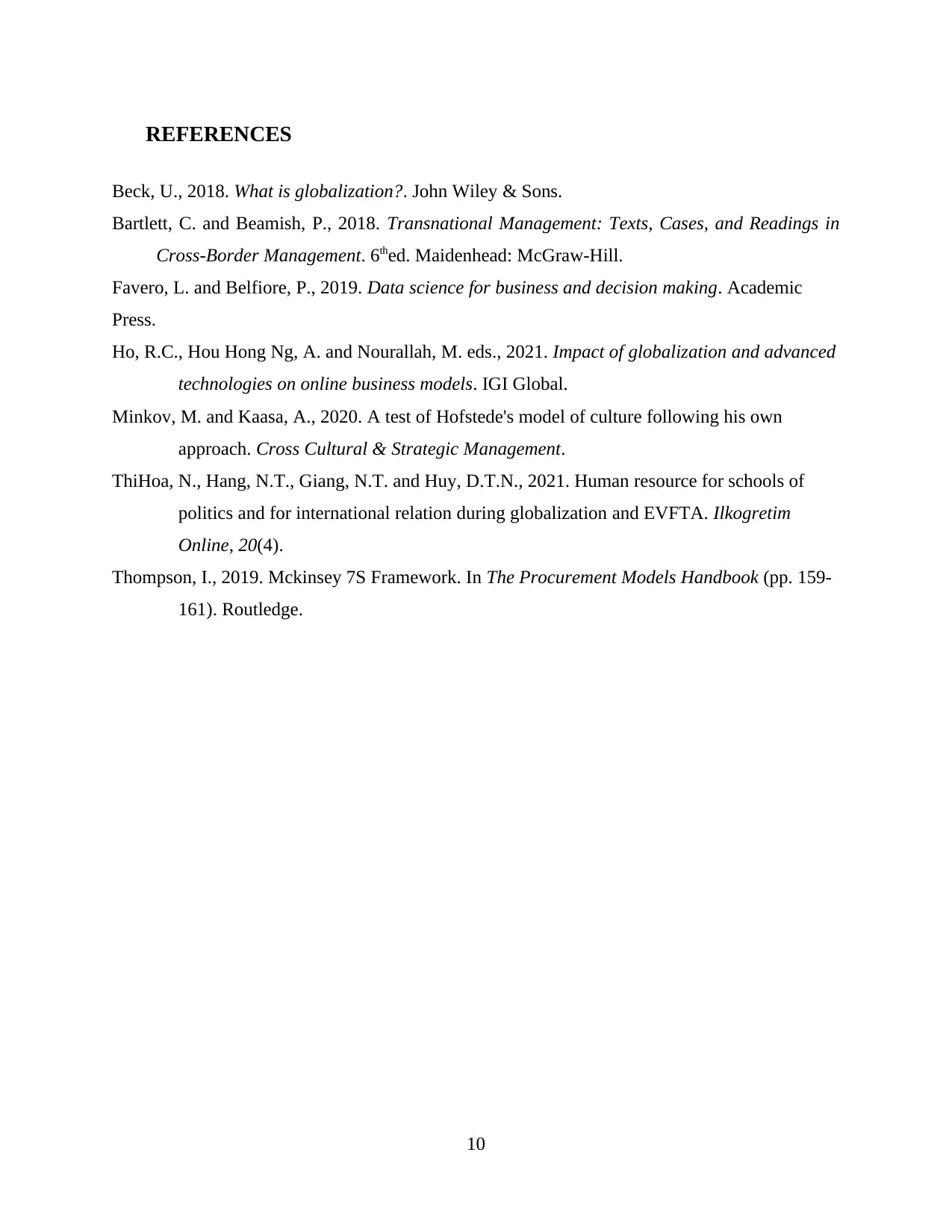
REFERENCES
Beck, U., 2018. What is globalization?. John Wiley & Sons.
Bartlett, C. and Beamish, P., 2018. Transnational Management: Texts, Cases, and Readings in
Cross-Border Management. 6thed. Maidenhead: McGraw-Hill.
Favero, L. and Belfiore, P., 2019. Data science for business and decision making. Academic
Press.
Ho, R.C., Hou Hong Ng, A. and Nourallah, M. eds., 2021. Impact of globalization and advanced
technologies on online business models. IGI Global.
Minkov, M. and Kaasa, A., 2020. A test of Hofstede's model of culture following his own
approach. Cross Cultural & Strategic Management.
ThiHoa, N., Hang, N.T., Giang, N.T. and Huy, D.T.N., 2021. Human resource for schools of
politics and for international relation during globalization and EVFTA. Ilkogretim
Online, 20(4).
Thompson, I., 2019. Mckinsey 7S Framework. In The Procurement Models Handbook (pp. 159-
161). Routledge.
10
Beck, U., 2018. What is globalization?. John Wiley & Sons.
Bartlett, C. and Beamish, P., 2018. Transnational Management: Texts, Cases, and Readings in
Cross-Border Management. 6thed. Maidenhead: McGraw-Hill.
Favero, L. and Belfiore, P., 2019. Data science for business and decision making. Academic
Press.
Ho, R.C., Hou Hong Ng, A. and Nourallah, M. eds., 2021. Impact of globalization and advanced
technologies on online business models. IGI Global.
Minkov, M. and Kaasa, A., 2020. A test of Hofstede's model of culture following his own
approach. Cross Cultural & Strategic Management.
ThiHoa, N., Hang, N.T., Giang, N.T. and Huy, D.T.N., 2021. Human resource for schools of
politics and for international relation during globalization and EVFTA. Ilkogretim
Online, 20(4).
Thompson, I., 2019. Mckinsey 7S Framework. In The Procurement Models Handbook (pp. 159-
161). Routledge.
10
1 out of 10
Related Documents
Your All-in-One AI-Powered Toolkit for Academic Success.
+13062052269
info@desklib.com
Available 24*7 on WhatsApp / Email
![[object Object]](/_next/static/media/star-bottom.7253800d.svg)
Unlock your academic potential
Copyright © 2020–2026 A2Z Services. All Rights Reserved. Developed and managed by ZUCOL.

